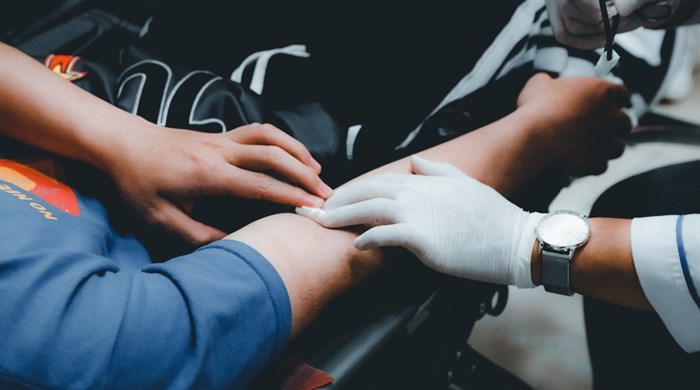
Image Credit: Unsplash/Nguyen Heip
August 31, 2022 - 7:30 AM
Staffing shortages that are hitting so many industries across the country are also making it harder for willing blood donors to make a donation.
And that may be putting lives at risk, says a frequent, long-term donor.
“There’s people probably dying out there who can’t get blood when they need it,” Chris Spires told iNFOnews.ca, her voice cracking with emotion. “It’s rather upsetting.”
Spires is a Penticton resident who has been donating blood every six weeks or so – as long as she doesn’t get anemic – for the past 20 years.
“Mom died of cancer and she had many blood transfusions and it kept her alive, probably for a good year longer, so I’m a big huge fan, particularly around graduation time, of donating blood,” she said.
She believes there are more accidents around graduation time.
Since May, however, she’s only been able to donate once at the Penticton clinic, having appointments cancelled and rebooked three times because of staffing shortages.
“Canadian Blood Services, like everyone else, is experiencing staffing challenges until we get through this latest wave of COVID or the current variant,” Gayle Voyer, the agency's director of donor relations for the B.C. and Yukon, told iNFOnews.ca. “We try our best to make sure staff, volunteers and donors follow our protocols.”
That may mean having to rebook some appointments. That can be on short notice if someone calls in sick the day of a clinic.
Most clinics in the region, which are held in Penticton, Peachland, Kelowna, Vernon, Salmon Arm and Kamloops, are mobile clinics and generally well attended, she said.
Voyer told iNFOnews.ca last week that, on a national level, the agency lost 31,000 donors during the COVID pandemic.
READ MORE: Canadian Blood Services faces uphill battle to attract B.C. donors
While some donors may be afraid of donating because of COVID still being around, Spires figures there’s more to it than that.
“They can’t donate even when they try to,” she said.
Not only are staffing shortages forcing appointments to be rebooked but, when Spires did get to donate, it took three hours rather than the normal one to one-and-a-half hours because the clinic seemed to be disorganized.
“I don’t know that Blood Services is at fault,” she said. “It’s like they’re blaming the public. Part of it may be the public but they have reasons for not going in, especially if they have to work – to go there and wait for three hours then be turned away anyways.”
Voyer said they ask people to be ready to give up an hour and, given improved procedures, it usually takes less time than that.
She could not speak directly about Spires’ experience or the mechanics of the Penticton clinic.
“We stay on top of that the best we can,” Voyer said. “Post-COVID we are experiencing staffing challenges. We try to mitigate those impact on donors as best we can.”
To contact a reporter for this story, email Rob Munro or call 250-808-0143 or email the editor. You can also submit photos, videos or news tips to the newsroom and be entered to win a monthly prize draw.
We welcome your comments and opinions on our stories but play nice. We won't censor or delete comments unless they contain off-topic statements or links, unnecessary vulgarity, false facts, spam or obviously fake profiles. If you have any concerns about what you see in comments, email the editor in the link above.
News from © iNFOnews, 2022